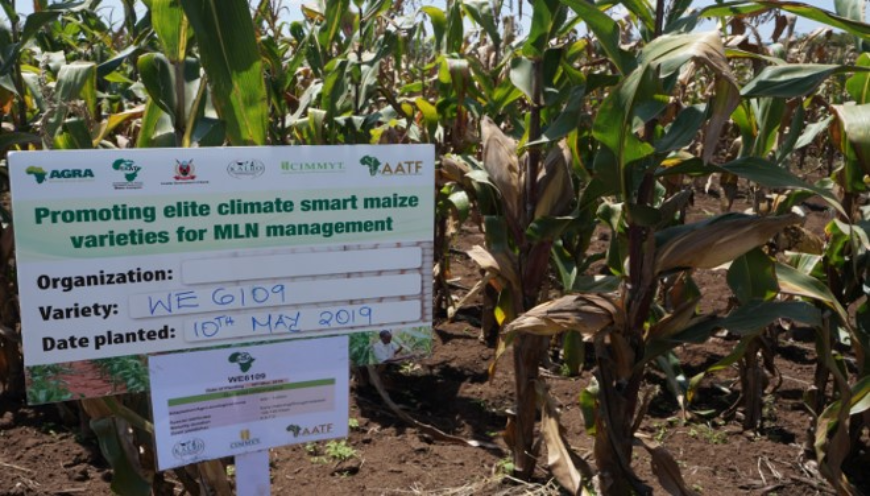- by J.Muthie
When Maureen Kiptum, a farmer in Perkerra Irrigation Scheme in Kenya’s Rift Valley region, first noticed yellow spots on her maize plants in 2013, she feared for the worst.
An outbreak of the notorious maize lethal necrosis diseases (MLN) had just begun and Kiptum and her rank of farmers in Marigat area had no idea of the disease so they simply called it ‘yellow’.
From her assessment, as a bloc leader in charge of 60 women out-growers contracted by Kenya Seed Company, almost all members of the 94-acre irrigated bloc were affected, with production falling by half.
“Most of us thought we had sprayed the wrong chemical while others said something had happened to the soil here,” says Maureen.
With no information on the disease, the agricultural extension officers in the region advised them to uproot and burn the plants.
Determined to know more about the mysterious disease, the 43-year-old mother of three, Maureen began attending the field-days organized by Kenya Seed Company and other partners where she was educated on how to contain the disease on her farm.
In her participation in field days, she learnt the importance of early planting during the long rains and switching to other crops such as New Rice for Africa (NERICA) rice and beans in the short rains season as one of the cost-effective ways of preventing the disease
George Njihia, operations manager at Faida Seeds based in Njoro, Nakuru County, recalls attending an MLN workshop in 2013, where he was informed that a trial of over 100 commercial maize varieties found all the seeds to be susceptible to MLN. Faida Seeds has since applied for MLN-tolerant maize varieties from CIMMYT, a partner in the MLN project, and began seed production in 2020.
“Maize is susceptible to MLN disease at all stages of crop development. If a maize field is infected early in the cropping cycle, complete yield loss may occur, so we cannot take chances. The training has also helped us with prevention approaches,” says Njihia
He mentions the application of insecticides to seeds prior to planting as crucial in early-stage protection against potential MLN vectors.
The MLN project is also helping seed companies like Western Seed reduce losses from the devastating MLN disease. The Kitale-based company destroyed up to 18 acres of maize in 2012 following an MLN attack.
Daniel Shiundu, the Farms and Research Manager at Western Seed, explains that the only option then was to destroy the entire crop in their field according to information available at the time.
In 2016, Western Seed staff members were introduced to the MLN project training that included internal quality control systems such as MLN disease scouting, sampling, and testing.
Daniel says the seed company and its out-growers discussed each of the 14 Standard Operating Procedures (SOP) on MLN disease management and how to adapt them to local conditions.
“We have 20 staff members trained on the 14 SOPs in MLN management and we are confident not just about our own systems producing MLN-free seed but about solving the problem to avoid such big losses in future,” he said.
“Today all our contracted farmers are observing a maize-free period of each year as a company policy. We are also enforcing timely planting at the onset of the long rainy season, which we now know helps to reduce disease incidence and pressure,” added Daniel.
An additional component of the project was the supply of Rapid Diagnostic Kits (RDKs) to allow easy detection and confirmation of the disease to avoid extra costs that seed companies incur due to seed rejection by the regulators.
According to Daniel, training and monitoring of seed companies operating in MLN affected zones should continue to ensure the production of MLN-free commercial seed – to protect farmers in affected zones and prevent introduction of MLN to non-affected areas.
Furthermore, visits to individual seed companies, out-growers and breeders at the national agricultural research stations in the five countries helped to generate important feedback on the MLN management checklists.
Increasing awareness on the disease
Information Education and Communication materials (IECs) were translated into Swahili and Amharic to increase awareness for users in Tanzania and Ethiopia.
About 75 per cent of the eight seed companies visited in Kenya in 2018 did not experience MLN in their seed production fields thanks to adherence to the SOPs and existing quality management systems to ensure continuous adherence.
The five programme target countries have reported reduced MLN incidences since partners began optimizing management protocols. Surveys among seed companies and farmers identified crop rotation, use of certified and MLN-tolerant seeds and insecticide application as some of the procedures that reduce the spread of the disease.



































































